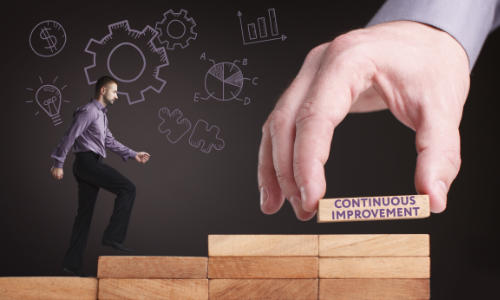The Modern Observer Group programs are based on the Businetiks system. Businetiks consists of seven basic elements for success. They are: Mindset, Focus, Operations, Communications, Innovation Techniques, Evaluation Metrics, and Continuous Improvement. To kick off 2024, we will be taking a closer look at each of these elements.
The idea of continuous improvement has become important for both entrepreneurs and leaders in today’s fast-paced and always-changing business world. Adopting a mindset of continuous improvement is not just a trend; it’s a must for businesses that want to stay successful in today’s tough markets. We will talk about what continuous improvement is, why it’s important for business owners and leaders, and how it can help an organization come up with new ideas and grow.
What Is It?
Continuous improvement, often referred to as Kaizen in Japanese philosophy, is the ongoing effort to enhance products, services, or processes incrementally. It is a philosophy that encourages small, incremental changes over time rather than radical, disruptive transformations. The aim is to create a culture where every team member is actively engaged in identifying opportunities for improvement and implementing changes to achieve better results.
Importance for Entrepreneurs:
- Adaptability to Change: Entrepreneurs operate in a rapidly changing environment. Continuous improvement allows them to adapt quickly to market shifts, technological advancements, and changing customer preferences.
- Enhanced Efficiency and Productivity: By constantly refining processes, entrepreneurs can eliminate inefficiencies and streamline operations. This results in improved productivity and cost-effectiveness, crucial for the success of startups and small businesses.
- Customer-Centric Approach: Entrepreneurs can use continuous improvement to gather feedback from customers and make iterative enhancements to products or services. This customer-centric approach can foster loyalty and satisfaction.
Importance for Executives:
- Strategic Decision-Making: Executives can use themethodologies to inform strategic decision-making. By regularly assessing and adjusting organizational strategies, they can stay ahead of the competition.
- Employee Engagement and Development: Continuous improvement encourages a culture of learning and development. Executives can invest in the professional growth of their teams, leading to increased engagement, job satisfaction, and retention.
- Innovation and Market Leadership: Executives who prioritize continuous improvement foster an environment conducive to innovation. This innovation can be a key differentiator, positioning the organization as a market leader.
How To Implement
- Employee Involvement: Encourage all team members, from entry-level employees to top executives, to actively participate in the process. Their diverse perspectives can lead to innovative solutions.
- Data-Driven Decision-Making: Utilize data and analytics to identify areas for improvement. Data-driven insights provide a solid foundation for making informed decisions that drive positive change.
- Iterative Approach: Embrace the concept of iteration. Small, consistent improvements compound over time and lead to significant advancements.
Continuous improvement is not just a methodology; it’s a mindset that can transform how entrepreneurs and executives approach their roles. By fostering a culture of continuous improvement, organizations can navigate challenges, seize opportunities, and build a foundation for sustained success in an ever-changing business landscape. As we look to the future, the ability to adapt and evolve through continuous improvement will be a defining factor for entrepreneurial and executive excellence.
See how a Modern Observer Group coach can help you improve your business, career and life. Schedule a call here or contact us at the information below. Modern Observer Group programs are based on the Businetiks system as detailed in the book, “The Businetiks Way.”



Connect With Us